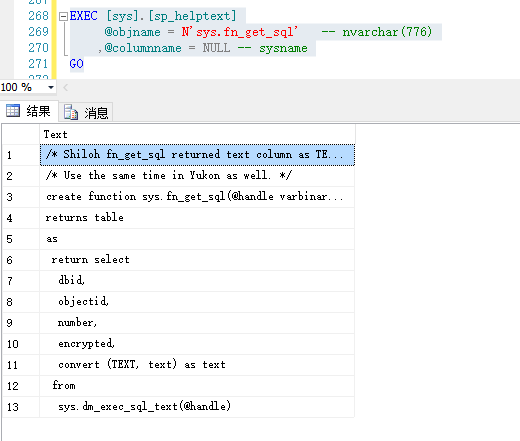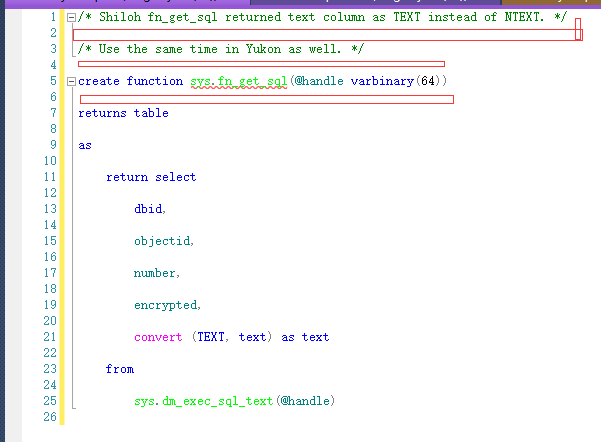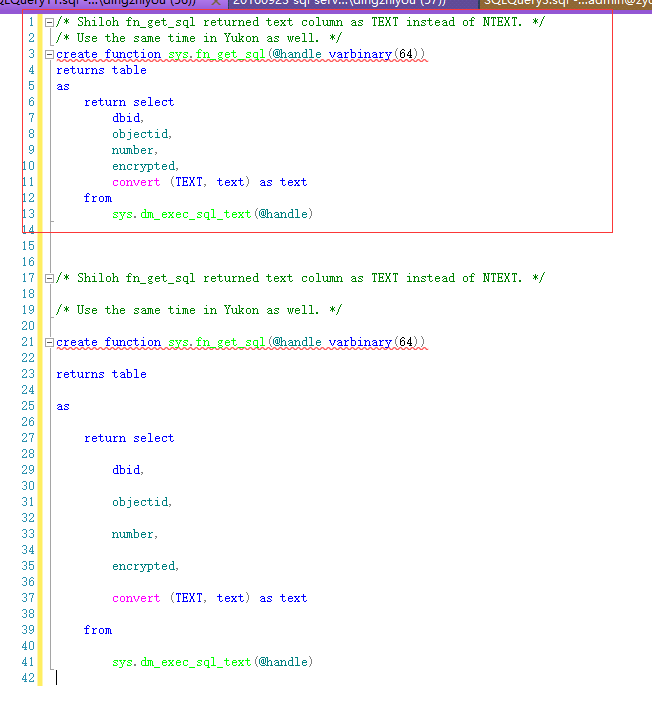本文目录列表:
近来在研究sql server提供的现实可编程对象定义体的方法包括:sys.syscomments(视图)、sys.all_sql_modules(sys.sql_modules)(视图)、object_definition(函数)和sys.sp_helptext(存储)。针对以上方式的不同以后有时间在写成博文。本文主要研究了sys.sp_helptext的显示效果,感觉有些不太美好。先看该存储的现实效果如下图:

上图现在看没有什么的,那就将如下图的Text字段列内容复制放入单独的文件中再看其效果如下图:

上图我红色矩形框标注的地方了吧,每个行后都增加了char(13)和char(10)这两个字符导致的这样的显示效果,如果按照这个结果为基础进行变更,就增加了可编程对象定义的长度(主要是char(13)和char(10))。
发现了sys.sp_helptext的显示效果,我自己感觉不太满意,那么就重构嘛。重构后的代码如下:
if object_id(N'dbo.usp_helptext', 'P') IS NOT NULL begin drop procedure [dbo].[usp_helptext]; end go create procedure [dbo].[usp_helptext] ( @objname nvarchar(776) ,@columnname sysname = NULL ,@keeporiginal bit = NULL ) as begin set nocount on set @keeporiginal = ISNULL(@keeporiginal, 1); declare @dbname sysname ,@objid int ,@BlankSpaceAdded int ,@BasePos int ,@CurrentPos int ,@TextLength int ,@LineId int ,@AddOnLen int ,@LFCR int --lengths of line feed carriage return ,@DefinedLength int /* NOTE: Length of @SyscomText is 4000 to replace the length of ** text column in syscomments. ** lengths on @Line, #CommentText Text column and ** value for @DefinedLength are all 255. These need to all have ** the same values. 255 was selected in order for the max length ** display using down level clients */ ,@SyscomText nvarchar(4000) ,@Line nvarchar(255) select @DefinedLength = 255 select @BlankSpaceAdded = 0 /*Keeps track of blank spaces at end of lines. Note Len function ignores trailing blank spaces*/ CREATE TABLE #CommentText (LineId int ,Text nvarchar(255) collate catalog_default) /* ** Make sure the @objname is local to the current database. */ select @dbname = parsename(@objname,3) if @dbname is null select @dbname = db_name() else if @dbname <> db_name() begin raiserror(15250,-1,-1) return (1) end /* ** See if @objname exists. */ select @objid = object_id(@objname) if (@objid is null) begin raiserror(15009,-1,-1,@objname,@dbname) return (1) end -- If second parameter was given. if ( @columnname is not null) begin -- Check if it is a table if (select count(*) from sys.objects where object_id = @objid and type in ('S ','U ','TF'))=0 begin raiserror(15218,-1,-1,@objname) return(1) end -- check if it is a correct column name if ((select 'count'=count(*) from sys.columns where name = @columnname and object_id = @objid) =0) begin raiserror(15645,-1,-1,@columnname) return(1) end if (ColumnProperty(@objid, @columnname, 'IsComputed') = 0) begin raiserror(15646,-1,-1,@columnname) return(1) end declare ms_crs_syscom CURSOR LOCAL FOR select text from syscomments where id = @objid and encrypted = 0 and number = (select column_id from sys.columns where name = @columnname and object_id = @objid) order by number,colid FOR READ ONLY end else if @objid < 0 -- Handle system-objects begin -- Check count of rows with text data if (select count(*) from master.sys.syscomments where id = @objid and text is not null) = 0 begin raiserror(15197,-1,-1,@objname) return (1) end declare ms_crs_syscom CURSOR LOCAL FOR select text from master.sys.syscomments where id = @objid ORDER BY number, colid FOR READ ONLY end else begin /* ** Find out how many lines of text are coming back, ** and return if there are none. */ if (select count(*) from syscomments c, sysobjects o where o.xtype not in ('S', 'U') and o.id = c.id and o.id = @objid) = 0 begin raiserror(15197,-1,-1,@objname) return (1) end if (select count(*) from syscomments where id = @objid and encrypted = 0) = 0 begin raiserror(15471,-1,-1,@objname) return (0) end declare ms_crs_syscom CURSOR LOCAL FOR select text from syscomments where id = @objid and encrypted = 0 ORDER BY number, colid FOR READ ONLY end /* ** else get the text. */ select @LFCR = 2 select @LineId = 1 open ms_crs_syscom fetch next from ms_crs_syscom into @SyscomText while @@fetch_status >= 0 begin select @BasePos = 1 select @CurrentPos = 1 select @TextLength = LEN(@SyscomText) while @CurrentPos != 0 begin --Looking for end of line followed by carriage return select @CurrentPos = CHARINDEX(char(13)+char(10), @SyscomText, @BasePos) --If carriage return found IF @CurrentPos != 0 begin /*If new value for @Lines length will be > then the **set length then insert current contents of @line **and proceed. */ while (isnull(LEN(@Line),0) + @BlankSpaceAdded + @CurrentPos-@BasePos + @LFCR) > @DefinedLength begin select @AddOnLen = @DefinedLength-(isnull(LEN(@Line),0) + @BlankSpaceAdded) insert #CommentText values ( @LineId, isnull(@Line, N'') + isnull(SUBSTRING(@SyscomText, @BasePos, @AddOnLen), N'')) select @Line = NULL, @LineId = @LineId + 1, @BasePos = @BasePos + @AddOnLen, @BlankSpaceAdded = 0 end -- 注释系统原来的使用如下修改 --select @Line = isnull(@Line, N'') + isnull(SUBSTRING(@SyscomText, @BasePos, @CurrentPos-@BasePos + @LFCR), N'') select @Line = isnull(@Line, N'') + isnull(SUBSTRING(@SyscomText, @BasePos, @CurrentPos-@BasePos + (CASE @keeporiginal WHEN 1 THEN @LFCR ELSE 0 END)), N'') select @BasePos = @CurrentPos+2 insert #CommentText values( @LineId, @Line ) select @LineId = @LineId + 1 select @Line = NULL end else --else carriage return not found begin IF @BasePos <= @TextLength begin /*If new value for @Lines length will be > then the **defined length */ while (isnull(LEN(@Line),0) + @BlankSpaceAdded + @TextLength-@BasePos+1 ) > @DefinedLength begin select @AddOnLen = @DefinedLength - (isnull(LEN(@Line),0) + @BlankSpaceAdded) INSERT #CommentText VALUES ( @LineId, isnull(@Line, N'') + isnull(SUBSTRING(@SyscomText, @BasePos, @AddOnLen), N'')) select @Line = NULL, @LineId = @LineId + 1, @BasePos = @BasePos + @AddOnLen, @BlankSpaceAdded = 0 end select @Line = isnull(@Line, N'') + isnull(SUBSTRING(@SyscomText, @BasePos, @TextLength-@BasePos+1 ), N'') if LEN(@Line) < @DefinedLength and charindex(' ', @SyscomText, @TextLength+1 ) > 0 begin select @Line = @Line + ' ', @BlankSpaceAdded = 1 end end end end FETCH NEXT from ms_crs_syscom into @SyscomText end IF @Line is NOT NULL INSERT #CommentText VALUES( @LineId, @Line ) select Text from #CommentText order by LineId CLOSE ms_crs_syscom DEALLOCATE ms_crs_syscom DROP TABLE #CommentText return (0) -- sp_helptext end go
以上修改之处我已经标注了,其他的均来源sys.sp_helptext内容。
那就看看重构后的效果,如下图:

以上显示并看不出和sys.sp_helptext的有何不同,继续讲Text内容复制放入单独为文件中效果如下图:

上图红色矩形框就是显示的效果,下部分是为了对比,这部分可以使用如下代码显示器效果:
EXEC [sys].[sp_helptext] @objname = N'sys.fn_get_sql' -- nvarchar(776) ,@columnname = NULL -- sysname GO EXEC [dbo].[usp_helptext] @objname = N'sys.fn_get_sql' -- nvarchar(776) ,@columnname = NULL -- sysname ,@keeporiginal = 1 -- bit GO
注意:dbo.usp_helptext兼容了sys.sp_helptext的功能。
查阅了sys.sp_helptext的源码和其对应的联机帮助文档,发现其输出的字段列Text每行最多255个双字节字符,其输出到客户端最终的大小是4000个双字节字符,这个可以通过编码程序(例如VS程序读取获取等)突破这个限制。
其最大的缺点是每行255个,有可能遇到一行中一个分隔符前一部分属于前一个255个双字节字符,后一部分属于后一个255双字节字符的前部分。
具体的测试代码如下:
IF OBJECT_ID(N'[dbo].[uvm_MyTestView]', 'V') IS NOT NULL BEGIN DROP VIEW [dbo].[uvm_MyTestView]; END GO CREATE VIEW [dbo].[uvm_MyTestView] AS SELECT 1 AS N'Col_1111111111111111111111111111111111111111111111111111111111111111111111111111111111111111111111111111111111111111111111111111', 2 AS [Col_2222222222222222222222222222222222222222222222222222222222222222222222222222222222222222222222222222222222222222222222222222] GO
效果展示如下图:

上图显示的效果就是出现了截断。消除这个限制那就使用函数object_definition(不过这个也有缺点的,以后才单独讲解输出可编程对象定义的内容的区别)。
学习sql server提供的系统对象,发现他们写的代码真的很严密的,很多规范以及异常处理等,确实学到了很多的,不过也发现有些sql server的内部限制是不写出来的,如表记录行最大8060字节的限制以及可边长长度溢出到row-overflow索引分配类型的数据页后也在原来的记录行中增加24字节的指针这样也可有能超过行最大8060字节的限制。可能我看理论太少的缘故吧。唯有继续精进,代码编程还是要继续的,有时候sql server客户端输出的最大4000个双字节字符的限制可以通过编程的方式得到完本的解决。
昨天看到园中的一篇博文print、sp_helptext的限制与扩展通过PRINT输出分批次打印超长的字符串,也会遇到某个标识符截断的问题,因为PRINT每次到打印到客户端总增加了char(13)和char(10)这两个字符,这样就可能将一个标识符分割为前后两个批次。